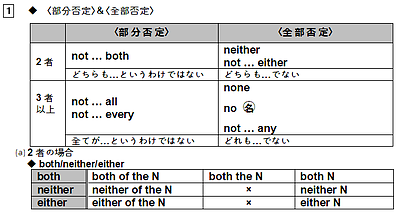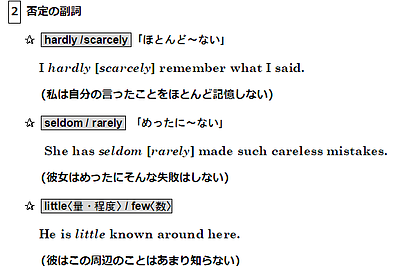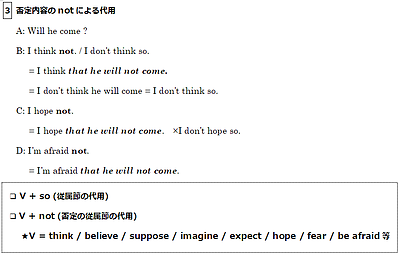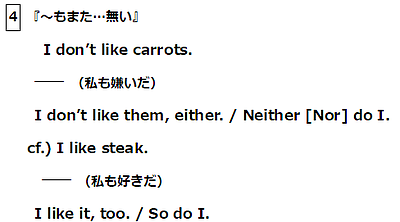
英検1級取得者によるオンライン個別指導のプロ
英語パーソナルジム HIET(ヒート)/ High Intensity English Training
- お電話での
お問い合わせ - 090-3825-5237
コラム
英文法5分ドリル【否定】⑤
2023年12月29日
上記の方法は、1つとしてこの問題に対する適切な答えではない。〈1語不足〉
【to / of / this / the / problem / answer / is / an / above / adequate / methods】.
❑ 3者以上の部分否定
➪ all / every を否定して表す
❑ 3者以上の全否定
➪ none of the 複数名詞 / no 名詞
❑ 2者の部分否定
➪ not both of 複数形名詞 / not both 複数形名詞
❑ 2者の全否定
➪ neither of 複数形名詞 / neither 単数名詞
与えられた和文が「A」=「B」 に記号化できること,
選択肢中に is があることから S V C の基本構造を想定。
主語として「上記の方法」は
形容詞 above「上記の」
を用いて
the above methods
と表現し
「この問題に対する適切な答え」は
an adequate answer to this problem
とまとめる。
それぞれを is でつなげたいが選択肢に否定語がない。
そこでnoneを補えるかが焦点。
正解:
上記の方法は、1つとしてこの問題に対する適切な答えではない。
None of the above methods is an adequate answer to this problem.
None of the methods mentioned earlier adequately addresses this issue.
The methods listed previously fail to provide a sufficient solution to this problem.
The solutions presented earlier aren't adequate to solve this problem.
国が偉大であるには必ずしも大国である必要はない。〈1語句不要〉
A nation【 necessarily / for / of / not / to be / is / powerful / it 】great.
<not necessarily>で《部分否定》を表す 。
「大国」という和文に対応する英語が無いので
形容詞 powerful を用いる。
need not be powerful
を連想し necessarily と not で部分否定を作る。
その後に目的を表す不定詞句
for it to be great
「それが偉大であるためには」
を続ける。
なお,itは文の主語a nationを受けるので,
for it は用いなくてもよいが不定詞 to be great の
意味上の主語を明確化するためにあえて置かれたもの。
正解:
国が偉大であるには必ずしも大国である必要はない。
A nation is not necessarily powerful for it to be great.
Greatness in a nation doesn't solely rely on its power.
A nation doesn't have to be powerful to be considered great.
Power isn't the sole determinant of greatness for a nation.
昨夏はほとんど雨が降らなかった。
【 at all / hardly / it / last / rained 】summer.
at all は否定文で用いられると
<not …at all>「全然…ない」
の形で否定の意味を強める。
not の代わりに程度を表す弱い否定語(準否定語)の
hardly と対応させて
<hardly…at all>「ほとんど全く…ない」
の形を作れるかが焦点。
hardlyを用いた表現として
<hardly any+A(名詞)>(=almost no A)
「ほとんどAない」
もよく出題される。
正解:
昨夏はほとんど雨が降らなかった。
It hardly rained at all last summer.
There was almost no rainfall during last summer.
Last summer saw very minimal to almost no precipitation.
There was scarcely any rain throughout the entirety of last summer.
彼女の言うこととすることは全く違う。〈1語不要〉
What she does【 far / disagrees / what / is / says / from / she 】.
与えられた英文の
What she does
を名詞節主語と考える。
名詞節主語は単数扱いなので is をVとして機能させる。
「まったく」という否定表現は
<far from A(名詞 / 動名詞 / 形容詞>
を用いる。Aに相当する名詞節をwhat でまとめ
全体で from の目的語として機能させる。
disagrees は使う余地がない。
正解:
彼女の言うこととすることは全く違う。
What she does is far from what she says.
Her actions are quite different from her words.
There's a significant disparity between her actions and her statements.
What she does diverges greatly from what she says.
私たちみなが自分の仕事に満足しているわけではない。
Not【 with / of / our / all / satisfied / us / work / are 】.
焦点は not の位置。
All of us are not satisfied …
とした場合
「全ての人が満足していない」
という意で全否定になり,与えられた和文に合わない。
考えを修正して
not を文頭に出して部分否定の構文を作る。
<Not all of 名詞+V…>「全ての名詞が…というわけでない」
〔参考〕
2つの解釈の可能性がある場合に注意が必要
All the passengers were not alive.
(a)〔全部否定〕「全ての乗客が生きていなかった」
(b)〔部分否定〕「全ての乗客が生きていたわけではない」
英作文で(b)の文意を表現する場合には
あいまいさを避けて次のように書くのがよい。
Not all the passengers were alive.
次の書き換えも確認。
Not all of us do.
= Some of us do, some of us don’t.
正解:
私たちみなが自分の仕事に満足しているわけではない。
Not all of us are satisfied with our work.
There are some among us who aren't content with our work.
Satisfaction with our work isn't universal among all of us.
It's not the case that every one of us is happy with our work.
彼はフランス語を話すと必ず少し間違う。
He【without / cannot / few / French / making / a / speak】mistakes.
<cannot ~ without …>
「 ~ すれば必ず…」
の表現が問われている。
直訳すると
「…することなく~できない」
だが
「必ず…」
の日本語に反応することが必要。
〔参考〕【否定の射程】
(a) It is not always good to be alone.〔部分否定〕
「独りでいることは必ずしもよくない」
(b) It is not good always to be alone.〔goodを否定〕
「常に独りでいることはよくない」
(c) It is good not to be always alone.〔不定詞を否定〕
「常に独りでいないのがよい」
休止が置かれる位置を / で示すと,
(a) It is not always good / to be alone.
(b) It is not good / always to be alone.
(c) It is good / not to be always alone.
正解:
彼はフランス語を話すと必ず少し間違う。
He cannot speak French without making a few mistakes.
Speaking French for him always involves making a few mistakes.
He invariably makes a few mistakes while speaking French.
Whenever he speaks French, he inevitably makes a few errors.
ここで彼に会えるとは全然思っていませんでした。
He’s【 expected / have / here / I’d / last / person / see / the / to 】.
「思っていなかった」
という和文に対応する否定語句が選択肢にない。
そこで last を用いた否定表現を作れるかが焦点。
He’s the last person …
「彼は最後の人だ」
▸「彼だけはない」
をまず決める。その後
I’d have expected to see him.
が前提となった表現を関係詞で作ると
… the last person whom I’d have expected to see here
ここから〈目的格は省略可〉のルールを用いる。
<the last A+関係代名詞節>
正解:
ここで彼に会えるとは全然思っていませんでした。
He’s the last person I’d have expected to see here.
Seeing him here is the least expected scenario for me.
Out of everyone, he's the person I'd least expect to encounter here.
If there's one person I wouldn't have expected to see here, it's him.
【音読基本英文】

上記の方法は、1つとしてこの問題に対する適切な答えではない。
None of the above methods is an adequate answer to this problem.
None of the methods mentioned earlier adequately addresses this issue.
The methods listed previously fail to provide a sufficient solution to this problem.
The solutions presented earlier aren't adequate to solve this problem.
国が偉大であるには必ずしも大国である必要はない。
A nation is not necessarily powerful for it to be great.
Greatness in a nation doesn't solely rely on its power.
A nation doesn't have to be powerful to be considered great.
Power isn't the sole determinant of greatness for a nation.
昨夏はほとんど雨が降らなかった。
It hardly rained at all last summer.
There was almost no rainfall during last summer.
Last summer saw very minimal to almost no precipitation.
There was scarcely any rain throughout the entirety of last summer.
彼女の言うこととすることは全く違う。
What she does is far from what she says.
Her actions are quite different from her words.
There's a significant disparity between her actions and her statements.
What she does diverges greatly from what she says.
私たちみなが自分の仕事に満足しているわけではない。
Not all of us are satisfied with our work.
There are some among us who aren't content with our work.
Satisfaction with our work isn't universal among all of us.
It's not the case that every one of us is happy with our work.
彼はフランス語を話すと必ず少し間違う。
He cannot speak French without making a few mistakes.
Speaking French for him always involves making a few mistakes.
He invariably makes a few mistakes while speaking French.
Whenever he speaks French, he inevitably makes a few errors.
ここで彼に会えるとは全然思っていませんでした。
He’s the last person I’d have expected to see here.
Seeing him here is the least expected scenario for me.
Out of everyone, he's the person I'd least expect to encounter here.
If there's one person I wouldn't have expected to see here, it's him.
要点整理【否定】

〈部分否定〉
I don’t know both of the parents.
(私は両親を両方知っているわけでない)
〈全部否定〉
I don’t know either of the parents.
=I know neither of the parents.
(私は両親どちらも知らない)
⒝ 3者以上の場合
〈部分否定〉
Not all of the passengers were rescued.
(全ての乗客が救出されたわけではない)
〈部分否定〉
Not every passenger was rescued.
(全ての乗客が救出されたわけではない)
〈全部否定〉
None of the passengers were rescued.
(救出された乗客はいなかった)
〈全部否定〉
No passengers were rescued.
(救出された乗客はいなかった)
〈部分否定〉
I’m not always at home on Sundays.
(私は日曜日にいつも家にいるわけではない)
〈全部否定〉
I’m never at home on Sundays.
(私は日曜日には家にいない)


5 《潜在否定》慣用表現 Best 10
⑴ anything but 「…どころではない」
He is anything but a musician.
(彼はミュージシャンどころではない)
⑵ the last 名 to do/関係詞節… 「最も…しそうにない~」
He is the last person to tell a lie.
(彼は最も嘘をつきそうにない人間だ)
⑶ far from
「…どころではない」
The result is far from satisfactory.
(その結果は満足に遠く及ばない)
⑷ beyond/above
「…を超越している」
He is above stealing.
(彼は盗みをするような人間ではない)
⑸ never fail to do
「…必ず~するのを忘れない」
Never fail to go to wash your hands before going for a drive.
(ドライブに行く前に必ず手を洗ってね)
⑹ free from
「…から開放されている」
No one is free from faults.
(人はだれでも欠点を持っている)
⑺ not …in the least
「まったく…ない」
This book is not in the least easy.
(この本はまったく簡単ではない)
⑻ by no means
「決して…ない」
She is by no means stupid.
(彼女は決して馬鹿ではない)
⑼ nothing but
「…以外の何者でもない」
Don’t believe what he says. He is nothing but a liar.
(彼の言うことを信じないで。彼は嘘つきだ)
⑽ do nothing but do
「…ばかりしている」
He does nothing but worry every day.
(彼は毎日心配ばかりしている)
6 〈倒置〉 否定語・only・well +助+S V
I little dreamed of seeing him again.
➪ Little did I dream of seeing him again.
(彼に再び会えるとは夢にも思っていなかった)
I have never seen her since then.
➪ Never have I seen her since then.
(それ以来,彼女には一度たりとも会っていない)
以下類例。
Only then did he realize it.
(彼はそのときはじめてそれを悟った)
Not only does she dislike him but she despises him.
(彼女は彼を嫌っているばかりでなく軽蔑している)
Hardly had he gone when they began to speak ill of him.
(彼が帰るとすぐ彼らは彼の悪口を言い始めた)
今後も英語学習に関わる情報、体験談を発信していきます。

関連するコラム
- 英文法5分ドリル【関係詞・接続詞】⑤ 2023-11-24
- 「音読」関連のコメント集:リアルな学習体験の宝庫です。 2024-04-25
- 子供英会話スクール:ここだけは確認すべき 2024-03-03
- 英文法5分ドリル【準動詞】形容詞的用法 ① 2023-11-29
- 大学別 TOEIC スコア ランキング ★ 3位:東京外大 ★ 2位:国際教養大 ★ 1位は ... 2024-02-25
コラムのテーマ一覧
カテゴリから記事を探す
TEX 二井原プロへの
お問い合わせ
マイベストプロを見た
と言うとスムーズです
勧誘を目的とした営業行為の上記電話番号によるお問合せはお断りしております。








